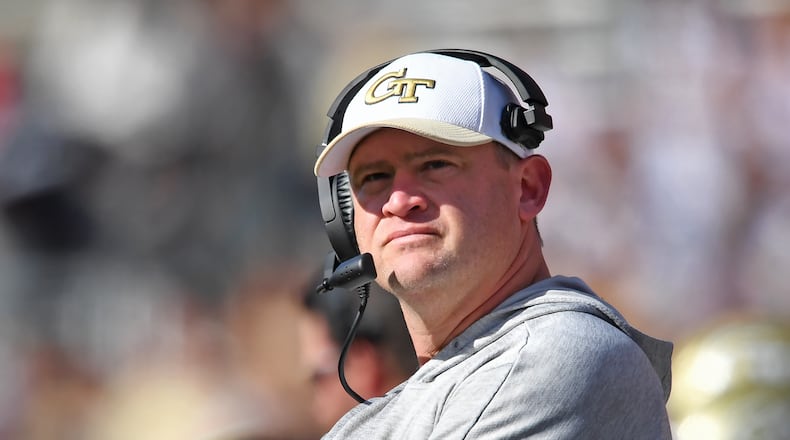High-school coaches in Georgia have a message for Georgia Tech coach Brent Key. However much the state’s prospects were being recruited before, that effort needs to increase.
“Tech must establish a local recruiting base, as well as statewide, too,” Westminster Schools coach Gerry Romberg wrote in an email to The Atlanta Journal-Constitution. “And stick to it year in and year out. Don’t deviate from recruiting the state.”
In November, about 30 high-school coaches in the state responded to a survey asking who they would like to see hired as the new coach of the Yellow Jackets, a vote won by Key. They also were asked what they would tell athletic director J Batt about the football program’s recruitment of Atlanta and the state. Perhaps unsurprisingly, they recommended increased attention to a state that this year produced the fourth-most players on NFL on opening-game rosters. Despite various challenges, coaches say, there’s enough to support a successful team at Tech.
“Georgia Tech needs to concentrate their recruiting efforts on the state and pencil in on the city,” South Atlanta High coach Michael Woolridge wrote. “There is enough talent in the state alone to be a consistent Top 25 program.”
Among U.S. cities, Atlanta was sixth in placing players on NFL opening-game rosters in the 2022 season.
“Atlanta is a hotbed when it comes to recruiting,” Langston Hughes High coach Daniel Williams wrote. “We have tons of talent in metro Atlanta.”
No Tech coach would dispute that. It was a focal point of former coach Geoff Collins’ stated approach. But how to get that talent in the doors to Tech has been an ongoing challenge. When Tech signed Jahmyr Gibbs out of Dalton High in the 2020 class, he was the first prospect in the state’s top 25 to sign with Tech since 2013.
Longtime Marist School coach Alan Chadwick, who also encouraged Tech to make deeper inroads into recruiting the entire state, recognized that the competition is fierce.
“That’s a tough sell when going up against so many great programs surrounding our state,” he wrote. “But I think every dollar spent recruiting Georgia is money well-spent, and Tech definitely needs to make progress in this area.”
That is indeed the battle that Tech faces. Not only does behemoth Georgia generally clean up on the state’s top prospects, but Alabama and Clemson also prioritize the state, as do most programs nearby. From among the state’s top 50 prospects in the 2022 signing class, as measured by the 247Sports Composite, 21 schools (besides Tech, which signed two) signed at least one player.
“You have to realize that Alabama, Auburn, UGA, Florida, Florida State, South Carolina, Clemson, Tennessee, North Carolina, N.C. State are all within four hours of Atlanta,” Stone Mountain High coach David Roberson wrote. “All of these programs have major stakes in athletes from not only Atlanta but the state of Georgia.”
With Tech’s academic standards also a challenge, Roberson’s solution was focusing more on prospects who may not be able to contribute immediately but can be developed into productive players as juniors and seniors.
“The models for GT are Stanford and Northwestern,” he wrote. “They just need to figure out how they can make the academic restrictions and situation work for them.”
A coach at one of the more prominent producers of college talent in the state suggested that improving its facilities would result in better recruiting, adding that Tech’s facilities are lagging in the ACC.
“Whoever the coach is has to be able to show the recruits around campus and football facilities and have it as a selling point, and that is where the athletic director comes in,” he wrote. “Last staff ‘sold’ Atlanta as a recruiting tool, but that is second to how much time the athletes spend in facilities.”
If a more focused approach within the state doesn’t net more blue-chippers, then perhaps it can unearth more underrated prospects. Tech has had no shortage of players that the powerhouses have bypassed who became effective performers. Freshman safety Clayton Powell-Lee is the latest. He was ranked the No. 110 prospect in the state, but became a highly productive starter this season. The challenge is identifying them, a process that can require heavy investment and coverage of the state.
Of the coaches surveyed, three in metro Atlanta – one in the city itself – told the AJC that their teams had been overlooked.
“I definitely feel as though recruiting of this area could be better,” Stephenson High coach Marcus Jelks wrote. “In the past three years, I have sat down with a Georgia Tech coach one time.”
Said one coach of a team in the Atlanta Public School system, “I have not seen a coach from GT at our place since before the pandemic.”
Another coach in the Fulton County Schools system wrote that in the spring, coaches from Georgia, Clemson and other top programs stopped by his school to talk with him about his players. The day after the visits from Georgia and Clemson, a Tech coach dropped off a packet without stopping to talk, according to the coach, who understandably was not happy.
“I know we don’t have too many kids with stars or power-five (scholarship) offers, but we will one day,” he wrote.
On Friday, college coaches were able to go back out on the road to visit high schools and make home visits. The state’s coaches surely will be curious to see Key’s approach.
“They’ve got to find ways to capitalize on (the talent),” Whitewater High coach Chad Frazier said.
About the Author
Keep Reading
The Latest
Featured


